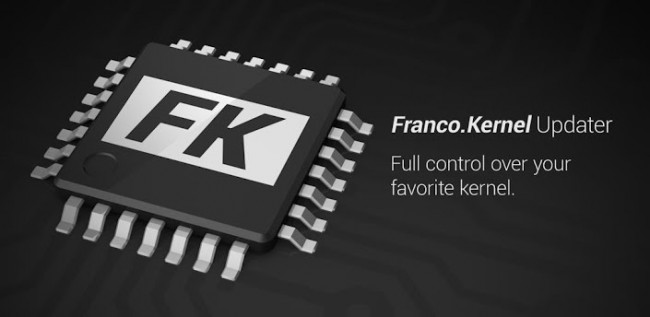Anthropic says its AI will not be used to spy on customers, even in government contracts. Here is what that means for AI governance, enterprise trust and defence partnerships.
Interview with the Dev: Franco.Kernel paves the way

Now, I have interviewed a couple of folks for the ‘Burn already and I have to be honest, I was a lot more familiar with their work than I am with today’s interviewee. I’ve read about Franco’s kernels, heck, I’ve even tried them on my Nexus S, and earlier on my Galaxy Nexus, and they’ve always been good, but there has always been something stopping me from using them full-time.
Don’t let my lack of adventurous spirit fool you though, Francisco Franco knows the drill, and his kernel is excellent.
In preparation for writing this post I obviously had to flash his kernel to see what’s what, and I’m not going to beat around the bush, because blimey, this kernel sure doesn’t. It’s as fast as I’ve seen, the battery life is astounding, not to mention the very handy application that Francisco has written to tweak, and tinker, with the myriad of settings available to franco.kernel users.
So without further ado, here you go, I posed some questions to Franco, and this is what he had to say…
Gearburn: As a kernel developer, why do you see the necessity for custom kernels?
Francisco Franco: There are several factors for that. I do Kernels for myself, because I feel the need for it. I don’t want all the debug flags and options in a Kernel that is used for consumers, us the users. Basically I want to control the Kernel and not having it control me.
GB: What is your development ethos?
FF: You got me here, I haven’t really thought about it, I just go with the flow.
GB: If you could summarise your kernels in a single caption, what would it be?
FF: That’s an easy one. Anyone that used my kernels knows that they offer great battery life with the best performance. That’s been the case in my Kernels from the LG P500 to the Galaxy S3.
GB: What is your current daily device?
FF: I don’t have a daily device because I have to jump from phone to phone to test whatever I throw at him. I use the i9300 more than any of the other ones that I own, but I hop on the Galaxy Nexus a lot because that’s the device where I develop the most.
GB: Which is your favourite Android device up to now?
FF: The Galaxy Nexus, no doubt. When I first got it I wasn’t particularly impressed by what it offered. ICS was alright, but not yet up to the expectations I built upon Google’s announcement. The more I worked with it the more I grew fond of it. Working in a Nexus environment is a pleasant experience for at least two reasons: unlocked bootloader and clean kernels. The ability to use fastboot is fantastic because the device NEVER bricks. I think the only possible way to brick the device is to wreck the bootloader partition, the boot and the recovery partitions, which even the dumbest person on earth wouldn’t be able to do without sensing it was just wrong.
Having a clean kernel is just as awesome. For example it’s a nightmare to work with HTC’s kernels. They are mostly broken with wrong code, badly documented code blocks; require tons of kernel modules, lots of warnings etc. Nexus kernels are bliss. We don’t need any modules to be loaded, the code is clean, is documented…it just works. Also pure Android beats any distribution from any other OEM.
GB: How did you get into kernel developing?
FF: I had got some Kernel background from my University classes, especially from Computer Architecture and Operating Systems and having compiled some desktop Linux Kernels helped lots. And it’s also part of who I am. I’m that type of guy that takes a product and think of new ways of making it better. Let me give you a better example. I’m not a very creative guy, but I build stuff on top of other stuff making it better. Kinda like Apple I guess. They take some idea and make it better, they don’t invent it (by the way I use some Apple products but I absolutely hate their schemes and their lawsuits and ideas about destroying Android). Because of all that I knew I could improve the several Android devices that I had by taking something that was very well-built (the Kernel) and make it better for users, including myself. Then here I am after thousands and thousands of compilations and thousands of happy users!!
GB: Is there a specific reason why you don’t develop ROMs as well? If so, why?
FF: ROMs are boring. The only real way to get performance improvements from Android OS is to improve their C++ libraries because C is a language that operates in a very low level compared to Java. ROMs are also boring because they take tons of time to compile for the slightest change. I can compile a Kernel in 2 minutes, load it up on my device and actually see an improvement the second the device is up. I like to see an improvement without having to actually look for it. ROMs are just that big thing, big compile times…just boring. But since August I have been helping with the development of MiNCO ROM for the Galaxy Nexus, with my friend Minooch. He does the boring parts and I help out with my kernel being pre-loaded and some other code improvements that no one sees but me.
GB: What do you think of the improvements that have been made to the OS over the past two years, because I have used Android since 2.2 on my HTC Desire, then I had a Nexus S and now I’ve got a Nexus Prime, I think that Android has got to a point where what Google is releasing is actually so polished that we don’t NEED custom ROMs to try improve our devices anymore, it’s more for fun, would you call that a fair comment?
Yes, I 100% relate to what you said. Google has done an immense work to take Android to iOS level. In fact I can safely say that with Jelly Bean Google’s OS is now a monster and is easily the best mobile operating system in the World. Sayonara iOS 🙂
GB: What do you make of all the current patent lawsuits involving Android and iOS? Do you think it’s hampering the development of these two incredibly popular technologies?
I don’t want to spend much time discussing this matter because to be honest I really don’t care, it’s not my fight and it doesn’t hurt me or my work in any way, but Samsung and Apple are just two best friends fighting one another to see which one is the best. They need each other but they are always fighting. Best friends, or even brothers, do that all the time. This is no different. But the patent system needs a major overhaul, no doubt.
GB: Which 3 Android apps could you not live without?
FF: That’s easy, because I don’t use many apps: my app, franco.Kernel updater, Digital Imported Radio and the XDA app.
GB: What would you like to see in the next Nexus device?
FF: Definitely a new kernel, and I’m 200% sure it will be an improved 3.4 Linux Kernel. I also want 2GB of Ram. The CPU I don’t care much because it will be better than the current one. I also want them to get rid of the AMOLED screen. I hope they change to a True HD IPS screen, similar to what the iPhone uses because AMOLED screens are just horribly calibrated. It’s a shame really.
You can find support for the kernel over at XDA, and you can also have a look at all of Francisco’s apps in the Play Store once you’ve decided whether to give it a go.


